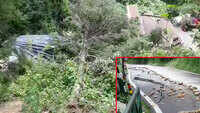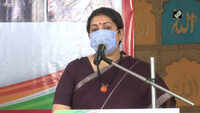
SRINAGAR: Rows of desolate shikaras anchored on the banks of Srinagar's picture-perfect Dal lake remind 75-year-old Ghulam Ahmad Kallu of the not-so-perfect yet contented life he once led. The past year, divided into two distinct halves of misery, has turned those memories into his only source of solace.
"If the August 5 lockdown snatched our livelihood, the Covid-19 lockdown took away the last vestiges of our existence as traditional shikara walas. Worse still, we have now been officially categorised as labourers," Kallu, the president of the Shikara Workers’ Union, told TOI.
Although slightly better off than others, Kallu has had to sell off the family gold and other valuables to survive the double whammy. Fellow shikara-wala Latif Ahmad Dar, a 50-year-old father of two, took to selling boiled eggs and cucumber salad on a pavement along the lake as the impact of the prolonged lockdown accompanying the nullification of Article 370 in August last year merged into the economic devastation wrought by the Covid-induced shutdown.
"I am not so sure we will ever get back to who we were," Dar said. "The romance of the Dal is gone. Even decades of unrest didn't cause as much damage as the past year has done."
Around 3,000 families depend on the shikara trade. In the good old days, there was never a shortage of tourists lining up for their turn to get on those colourful boats for a long-cherished ride across the Dal and Nigeen lakes. "I lived a pretty comfortable life with the money I earned back then, bringing up four sons and three daughters. But it's been bleak for a long time now. No tourists, no work and, therefore, no money," Kallu said.
Such is the desperation that many shikara-walas who would earn a couple of thousand in a day are now doing the rounds of government offices to get the ex gratia of Rs 1,000 promised to senior citizens by finance minister Nirmala Sitharaman on March 27 as Covid relief.
Like Dar, younger shikara-walas are vending small household items or selling fruit on carts at various spots near the lake where they would court tourists until the middle of last year. Some have turned vegetable vendors. "There's nobody to take a shikara ride, but you have to get by somehow," said Abdul Gaffar.
Dar's 45-year-old younger brother Farooq has anchored his shikara next to a dilapidated houseboat in which his five-member family lives. "I had taken up a job as a painter after the August lockdown, but the pandemic took that away, too," he said.
Dar's two sons have stopped going to school. "We should have food to eat first. Other things can come later," he said.
According to tourism officials, 20,000-25,000 tourists were in the Valley when the Union home ministry issued an advisory asking all visitors to leave days before J&K went into an unprecedented lockdown on August 5, 2019. "Nobody had any idea that the lockdown would paralyse everything for months. And just when we were trying to recover from that, Covid struck. J&K tourism might not survive this," Kallu said.
"If the August 5 lockdown snatched our livelihood, the Covid-19 lockdown took away the last vestiges of our existence as traditional shikara walas. Worse still, we have now been officially categorised as labourers," Kallu, the president of the Shikara Workers’ Union, told TOI.
Although slightly better off than others, Kallu has had to sell off the family gold and other valuables to survive the double whammy. Fellow shikara-wala Latif Ahmad Dar, a 50-year-old father of two, took to selling boiled eggs and cucumber salad on a pavement along the lake as the impact of the prolonged lockdown accompanying the nullification of Article 370 in August last year merged into the economic devastation wrought by the Covid-induced shutdown.
"I am not so sure we will ever get back to who we were," Dar said. "The romance of the Dal is gone. Even decades of unrest didn't cause as much damage as the past year has done."
Around 3,000 families depend on the shikara trade. In the good old days, there was never a shortage of tourists lining up for their turn to get on those colourful boats for a long-cherished ride across the Dal and Nigeen lakes. "I lived a pretty comfortable life with the money I earned back then, bringing up four sons and three daughters. But it's been bleak for a long time now. No tourists, no work and, therefore, no money," Kallu said.
Such is the desperation that many shikara-walas who would earn a couple of thousand in a day are now doing the rounds of government offices to get the ex gratia of Rs 1,000 promised to senior citizens by finance minister Nirmala Sitharaman on March 27 as Covid relief.
Like Dar, younger shikara-walas are vending small household items or selling fruit on carts at various spots near the lake where they would court tourists until the middle of last year. Some have turned vegetable vendors. "There's nobody to take a shikara ride, but you have to get by somehow," said Abdul Gaffar.
Dar's 45-year-old younger brother Farooq has anchored his shikara next to a dilapidated houseboat in which his five-member family lives. "I had taken up a job as a painter after the August lockdown, but the pandemic took that away, too," he said.
Dar's two sons have stopped going to school. "We should have food to eat first. Other things can come later," he said.
According to tourism officials, 20,000-25,000 tourists were in the Valley when the Union home ministry issued an advisory asking all visitors to leave days before J&K went into an unprecedented lockdown on August 5, 2019. "Nobody had any idea that the lockdown would paralyse everything for months. And just when we were trying to recover from that, Covid struck. J&K tourism might not survive this," Kallu said.
Download
The Times of India News App for Latest India News

Coronavirus outbreak
Trending Topics
LATEST VIDEOS
India
 Rains, landslides cause widespread damage in Mussoorie
Rains, landslides cause widespread damage in Mussoorie  Ram temple construction is not just a religious affair: RSS leader
Ram temple construction is not just a religious affair: RSS leader  Steps should be taken to scrap 2G: Mukesh Ambani
Steps should be taken to scrap 2G: Mukesh Ambani  Triple Talaq 1st anniversary: ‘Congress never aimed at making Muslim women’s lives better’, says Smriti Irani
Triple Talaq 1st anniversary: ‘Congress never aimed at making Muslim women’s lives better’, says Smriti Irani  Assam CM Sonowal inspects erosion caused by Kundil River on NH 37 in Sadiya
Assam CM Sonowal inspects erosion caused by Kundil River on NH 37 in Sadiya  UGC welcomes multidisciplinary formula in New Education Policy
UGC welcomes multidisciplinary formula in New Education Policy
More from TOI
Navbharat Times
Featured Today in Travel
Quick Links
Coronavirus in MumbaiCoronavirus in KolkataCoronavirus in HyderabadCoronavirus in DelhiCoronavirus in BangaloreCoronavirus symptomsCoronavirus in IndiaWhat is CoronavirusCoronavirus NewsSolar EclipseNPRWhat is NRCCAB BillCAB and NRCRTI BillPodcast newsLok SabhaShiv SenaYSRCPCongressBJP newsUIDAIIndian ArmyISRO newsSupreme Court
Get the app



